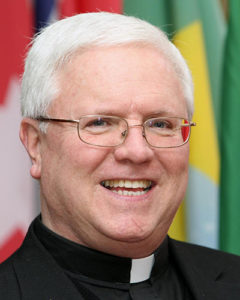Wednesday, Jan. 25, is the Feast of the Conversion of St. Paul. It’s a day that marks a monumental moment in human history, when a man caught up in hatred and violence was stopped in his tracks and set on a path to make God’s way of peace and love known to people throughout the world.
Paul’s conversion occurred when he was on his way from Jerusalem to Damascus on a mission to hunt down Christians, arrest them and return them to Jerusalem for questioning and possible execution. And it was on that journey that Christ intervened in his life.
In Acts 9 we read, “Now he was going along and approaching Damascus, suddenly a light from heaven flashed around him. He fell to the ground and heard a voice saying to him, ‘Saul, Saul, why do you persecute Me?’ He asked, ‘Who are you, Lord?’ The reply came, ‘I am Jesus, whom you are persecuting. But get up and enter the city, and you will be told what you are to do.’”
If we ever despair of a person’s ability to change course from an errant way of life, remember this amazing moment in the life of St. Paul. After taking part in such evil deeds as the stoning of St. Stephen and other vicious persecutions of Christians, Paul’s heart was opened to a radical change. It’s the kind of change that happens for people in many different ways. Often, it is a slower process that works through the circumstances of one’s life, because God understands the inner workings of our hearts and what is needed to win us over to his love.
But we should never doubt God’s power to intervene in our lives, to turn us from one path to another so he can lead us to sainthood. And that is what we are called to. It’s what Paul was called to on this new road Christ set him upon, and how he answered that call has resounded throughout the centuries as a clear witness of what it means to devote oneself completely to Christ.
Paul’s line in Romans 5, “where sin increased, grace abounded all the more,” reflects his trajectory. Once he began his new life in Christ, he took up his mission with even more zeal than he had before. Where sin once abounded in his life, grace took its place and increased all the more.
In 2 Corinthians, God tells Paul, “My grace is sufficient for you, for power is made perfect in weakness.” This was a defining lesson for Paul from the moment he met Christ on the road to Damascus until his martyrdom many years later. It was the lesson he needed to learn in order to live in the light of Christ. He needed to gain respect for weakness as the place where God meets us. Once he understood that, he was compelled to champion the humble of heart for the rest of his life.
This is the path to sainthood that God calls each of us to follow. Christ is present in our midst among the weakest members of our families and communities. He is present in their suffering, waiting for us to meet him through the love we show to those in need. When we do that, we are following in the footsteps of St. Paul, who welled up with the compassion of God, changing the course of his own life and the course of history.
For a free copy of The Christophers’ THE GIFT OF RECONCILIATION, write: The Christophers, 5 Hanover Square, New York, NY 10004 or email . Fr. Dougherty is on the Christophers’ board of directors.

Fr. Ed Dougherty, M.M
